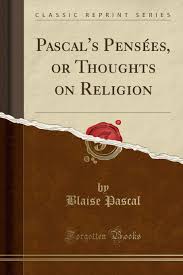Pensées Page #4
The Pensées is a collection of fragments on theology and philosophy written by 17th-century philosopher and mathematician Blaise Pascal. Pascal's religious conversion led him into a life of asceticism, and the Pensées was in many ways his life's work. The Pensées represented Pascal's defense of the Christian religion.
I do not wish to enter any further than necessary upon the question of the heterodoxy of Jansenism; and it is no concern of this essay, whether the Five Propositions condemned at Rome were really maintained by Jansenius in his book Augustinus; or whether we should deplore or approve the consequent decay (indeed with some persecution) of Port-Royal. It is impossible to discuss the matter without becoming involved as a controversialist either for or against Rome. But in a man of the type of Pascal--and the type always exists--there is, I think, an ingredient of what may be called Jansenism of temperament, without identifying it with the Jansenism of Jansenius and of other devout and sincere, but not immensely gifted doctors.[B] It is accordingly needful to state in brief what the dangerous doctrine of Jansenius was, without advancing too far into theological refinements. It is recognised in Christian theology--and indeed on a lower plane it is recognised by all men in affairs of daily life--that freewill or the natural effort and ability of the individual man, and also supernatural grace, a gift accorded we know not quite how, are both required, in co-operation, for salvation. Though numerous theologians have set their wits at the problem, it ends in a mystery which we can perceive but not finally decipher. At least, it is obvious that, like any doctrine, a slight excess or deviation to one side or the other will precipitate a heresy. The Pelagians, who were refuted by St. Augustine, emphasised the efficacy of human effort and belittled the importance of supernatural grace. The Calvinists emphasised the degradation of man through Original Sin, and considered mankind so corrupt that the will was of no avail; and thus fell into the doctrine of predestination. It was upon the doctrine of grace according to St. Augustine that the Jansenists relied; and the Augustinus of Jansenius was presented as a sound exposition of the Augustinian views. [B] The great man of Port-Royal was of course Saint-Cyran, but any one who is interested will certainly consult, first of all, the book of Sainte-Beuve mentioned. Such heresies are never antiquated, because they forever assume new forms. For instance, the insistence upon good works and "service" which is preached from many quarters, or the simple faith that any one who lives a good and useful life need have no "morbid" anxieties about salvation, is a form of Pelagianism. On the other hand, one sometimes hears enounced the view that it will make no real difference if all the traditional religious sanctions for moral behaviour break down, because those who are born and bred to be nice people will always prefer to behave nicely, and those who are not will behave otherwise in any case: and this is surely a form of predestination--for the hazard of being born a nice person or not is as uncertain as the gift of grace. It is likely that Pascal was attracted as much by the fruits of Jansenism in the life of Port-Royal as by the doctrine itself. This devout, ascetic, thoroughgoing society, striving heroically in the midst of a relaxed and easy-going Christianity, was formed to attract a nature so concentrated, so passionate, and so thoroughgoing as Pascal's. But the insistence upon the degraded and helpless state of man, in Jansenism, is something also to which we must be grateful, for to it we owe the magnificent analysis of human motives and occupations which was to have constituted the early part of his book. And apart from the Jansenism which is the work of a not very eminent bishop who wrote a Latin treatise which is now unread, there is also, so to speak, a Jansenism of the individual biography. A moment of Jansenism may naturally take place, and take place rightly, in the individual; particularly in the life of a man of great and intense intellectual powers, who cannot avoid seeing through human beings and observing the vanity of their thoughts and of their avocations, their dishonesty and self-deceptions, the insincerity of their emotions, their cowardice, the pettiness of their real ambitions. Actually, considering that Pascal died at the age of thirty-nine, one must be amazed at the balance and justice of his observations; much greater maturity is required for these qualities, than for any mathematical or scientific greatness. How easily his brooding on the misery of man without God might have encouraged in him the sin of spiritual pride, the concupiscence de l'esprit, and how fast a hold he has of humility! And although Pascal brings to his work the same powers which he exerted in science, it is not as a scientist that he presents himself. He does not seem to say to the reader: I am one of the most distinguished scientists of the day; I understand many matters which will always be mysteries to you, and through science I have come to the Faith; you therefore who are not initiated into science ought to have faith if I have it. He is fully aware of the difference of subject-matter; and his famous distinction between the esprit de géométrie and the esprit de finesse is one to ponder over. It is the just combination of the scientist, the honnête homme, and the religious nature with a passionate craving for God, that makes Pascal unique. He succeeds where Descartes fails; for in Descartes the element of esprit de géométrie is excessive.[C] And in a few phrases about Descartes, in the present book, Pascal laid his finger on the place of weakness. [C] For a brilliant criticism of the errors of Descartes from a theological point of view the reader is referred to Three Reformers by Jacques Maritain (translation published by Sheed & Ward). He who reads this book will observe at once its fragmentary nature; but only after some study will perceive that the fragmentariness lies in the expression more than in the thought. The "thoughts" cannot be detached from each other and quoted as if each were complete in itself. Le cœur a ses raisons que la raison ne connaît point: how often one has heard that quoted, and quoted often to the wrong purpose! For this is by no means an exaltation of the "heart" over the "head," a defence of unreason. The heart, in Pascal's terminology, is itself truly rational if it is truly the heart. For him, in theological matters, which seemed to him much larger, more difficult, and more important than scientific matters, the whole personality is involved.
Translation
Translate and read this book in other languages:
Select another language:
- - Select -
- 简体中文 (Chinese - Simplified)
- 繁體中文 (Chinese - Traditional)
- Español (Spanish)
- Esperanto (Esperanto)
- 日本語 (Japanese)
- Português (Portuguese)
- Deutsch (German)
- العربية (Arabic)
- Français (French)
- Русский (Russian)
- ಕನ್ನಡ (Kannada)
- 한국어 (Korean)
- עברית (Hebrew)
- Gaeilge (Irish)
- Українська (Ukrainian)
- اردو (Urdu)
- Magyar (Hungarian)
- मानक हिन्दी (Hindi)
- Indonesia (Indonesian)
- Italiano (Italian)
- தமிழ் (Tamil)
- Türkçe (Turkish)
- తెలుగు (Telugu)
- ภาษาไทย (Thai)
- Tiếng Việt (Vietnamese)
- Čeština (Czech)
- Polski (Polish)
- Bahasa Indonesia (Indonesian)
- Românește (Romanian)
- Nederlands (Dutch)
- Ελληνικά (Greek)
- Latinum (Latin)
- Svenska (Swedish)
- Dansk (Danish)
- Suomi (Finnish)
- فارسی (Persian)
- ייִדיש (Yiddish)
- հայերեն (Armenian)
- Norsk (Norwegian)
- English (English)
Citation
Use the citation below to add this book to your bibliography:
Style:MLAChicagoAPA
"Pensées Books." Literature.com. STANDS4 LLC, 2024. Web. 22 Dec. 2024. <https://www.literature.com/book/pens%C3%A9es_114>.




Discuss this Pensées book with the community:
Report Comment
We're doing our best to make sure our content is useful, accurate and safe.
If by any chance you spot an inappropriate comment while navigating through our website please use this form to let us know, and we'll take care of it shortly.
Attachment
You need to be logged in to favorite.
Log In